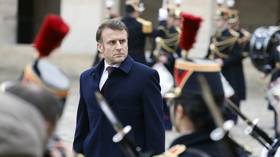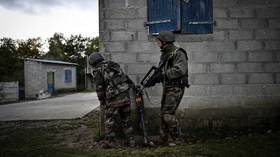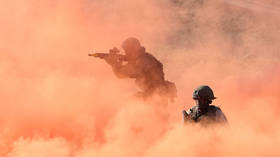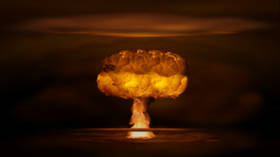How Macron’s latest Ukraine comments blew NATO apart

Senior Western officials have rushed to disavow remarks made by French President Emmanuel Macron this week suggesting that some NATO members could deploy troops in Ukraine. Moscow responded by saying such a move would make a direct war with the US-led military bloc “inevitable.”
Here is how the French leader apparently overplayed his hand, highlighting the lack of cohesion within the North Atlantic alliance regarding how to proceed with the Ukraine crisis.
Supporters of Kiev gathered in Paris on Monday at Macron’s invitation to discuss what to do as hostilities between Russia and Ukraine entered their third year. Ukrainian President Zelensky reportedly participated in the event, which was held behind closed doors, via a video link.
The leaders convened the week after Ukrainian troops suffered a new series of setbacks on the battlefield, having lost their foothold in Avdeevka in Russia's Donetsk People's Republic. The Kiev government is also struggling to replenish lost troops and controversial mobilization reform which would introduce harsh punishments for dodging the draft is mired in parliament. Meanwhile, a partisan row in the US Congress has kept a White House request for additional Ukraine aid in legislative limbo.
The Elysee Palace touted the gathering as a way for participants to “reaffirm their unity” and express their determination to defeat Russia. Some guests, critical of the general Western approach to the conflict, expressed concerns beforehand. Slovak Prime Minister Robert Fico said the agenda “sends chills down my spine.”
Following the private discussions, Macron described to the media the various ways the West could bolster Ukraine, arguing that preventing a Russian victory served European security interests. There was “no consensus to officially back any ground troops,” he said, while controversially adding that “nothing should be excluded.”
The EU members have gradually warmed to giving Kiev increasingly sophisticated weapons. While they originally offered “just sleeping bags and helmets,” Macron pointed out, they have since taken steps to provide long-range missiles and fighter jets. The same may happen with the deployment of troops, he claimed, while declining to say which nations were willing to send in their militaries.
European officials balked, however, quickly denying that they had any intention to put boots on the ground in Ukraine. From skeptics Hungary and Slovakia to staunch pro-Ukraine nations such as Poland and Germany, governments insisted that no such plans were in motion.
The same message came from NATO Secretary General Jens Stoltenberg and Washington. President Joe Biden “has been clear that the US will not send troops to fight in Ukraine,” National Security Council spokeswoman Adrienne Watson told the media.
French politicians rebuked Macron. Florian Philippot of the minor nationalist Les Patriotes party urged lawmakers to stop the president, should he attempt to intervene in Ukraine.
MP Jean-Luc Melenchon called Macron’s idea “madness,” claiming it would pit nuclear powers directly against each other.
The Russian government reacted with some alarm. Kremlin spokesman Dmitry Peskov noted that while most of Macron’s anti-Russian rhetoric at the press conference was just a repetition of things he’d said in the past, the public on-record comment regarding an acknowledged presence of NATO troops in Ukraine was new.
If realized, people would “have to talk not about the probability, but rather the inevitability” of a direct Russian-NATO clash, the official noted. Western leaders should think hard about how that would serve their national interests, Peskov said.
Western officials have previously acknowledged having small specialized military contingents in Ukraine. The practice was confirmed by sources cited by The Financial Times on Tuesday, as the backlash against Macron’s remark unfolded.
State Duma chairman Vyacheslav Volodin suggested that the French president has resorted to using the Ukraine crisis to deflect criticisms of his domestic policies.
”To keep his personal power, Macron found no better option than to ignite World War III. His initiatives are becoming a threat to the people of France,” he said.
The French president “has tried to fill the leadership vacuum” left by Washington, but his attempt “has backfired,” policy expert Jana Puglierin told The Wall Street Journal. He “unnecessarily introduced potential for division into NATO, whose member states are extremely skeptical on this issue. This is no way to promote European unity and strength.”
The debacle has led to “confusion about the unity of the alliance and questions about whether his comments amounted to an empty threat,” The New York Times wrote. USA Today described Macron’s proposal as a “swiftly punctured trial balloon.”















